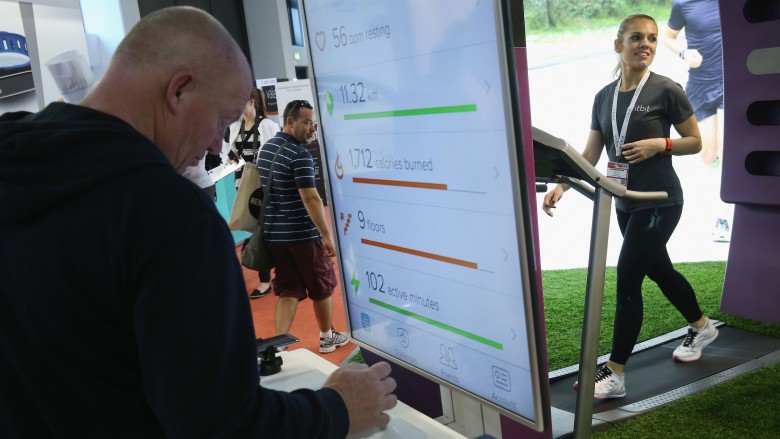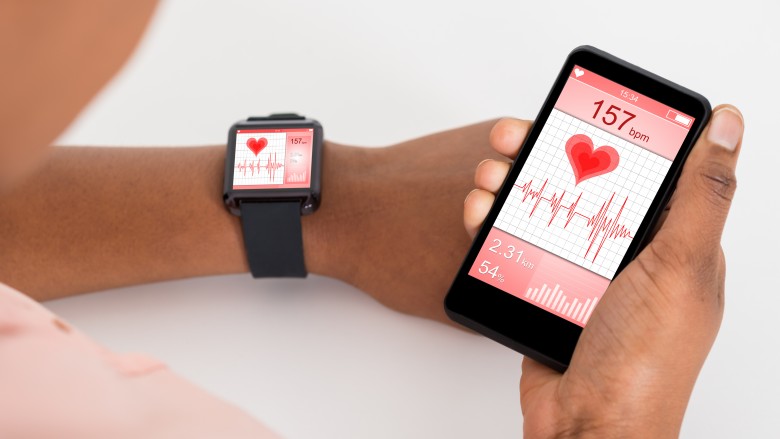The Untold Truth Of The Fitbit
Fitbits have taken the fitness world by storm, and some people are just downright addicted to them. If you have one, you might not be able to leave the house without it. You might obsessively check to see how many steps you've taken that day, or how long you've slept, or how your heart rate went up during your latest burst of cardio. But there's so, so much more to that Fitbit on your wrist, so we took a look behind the fitness craze to find out what most people don't know.
It's getting very Big Brother-ish
Your health and habits are both very personal things, and it goes without saying there are some things you really just want to keep to yourself. In 2015, though, a Swiss insurance company announced it was going to be kick-starting a program they called MyStep. Through this program, the more you walked and met your 10,000-a-day step goals, the better you took care of yourself, the logic went. Those that didn't meet their goals — or didn't participate in the program — were going to get hit with some hefty penalties in the form of rising premiums.
Subscribers to CSS Insurance haven't been the only ones to have their daily activity levels monitored through their Fitbits, either. For 2015's fall semester, the Oral Roberts University put new rules in place for students. They would be required to wear Fitbits, and if their activity levels dropped too low, their grades would drop, too.
According to The Guardian, the university's president, William Wilson said, "The marriage of new technology with our physical fitness requirements is something that sets ORU apart. In fact, when we began this innovative program in the fall of 2015, we were the first university in the world to offer this unique approach to a fitness program."
They went on to clarify that there are no GPS trackers enabled on the Fitbits, but they are recording data 24/7. They're calling it "whole person education", but there are still some major questions about how much invasion of privacy is too much.
There have been some humiliating data slip-ups
In 2011, Fitbit users found themselves in for a major shock. Not only were their profiles public by default, but a quick Google search could allow you to find pretty much anyone's information. That includes not just how active you (or, say, your neighbors) were, but what kind of activities you were involved in. And, shall we say, even more personal details? Users found their entries — some of which bore telling labels like "Sexual Activity, Active, vigorous effort" — on the internet for all to see.
The realization hit during the Fourth of July weekend, and to their credit, Fitbit immediately went into crisis control and locked down all information logged by their users. They also reached out to search engines to ask them to remove the data, and it was only then that a very important lesson was learned by all. Fitbit's default settings were changed to private, but that's not the end of the problems.
In January 2016, some Fitbit users found their accounts hacked by shady cyber thieves who were trying to use active accounts to order replacement Fitbits through their warranty. Other potential dangers came to light, too, when users realized hackers also had access to their schedules, the times they were usually asleep, and their regular routines for running or biking.
A month later, things got even scarier. Researchers from the University of Toronto (via PCWorld) took a look at just what information was being broadcast by a number of wearable fitness trackers that included the Fitbit. They found that every one of them (except for the Apple Watch) emitted a constant Bluetooth signal that could be picked up and tracked. Creepy? It gets creepier. They also found the information the trackers were sending could be read by beacons, and that technology can be used by retail stores and shopping centers to profile customers as they walked in the door.
The legalities haven't caught up to the technology
If you're wondering whether or not that's even legal, you might be surprised. When you have a conversation with your doctor, you're protected by patient privacy laws. Fitbit — as well as other fitness wearables and data trackers — have been around for years, with no updates to privacy laws extended to cover their data.
In 1996, the Health Insurance Portability and Accountability Act was put in place to protect the data collected by insurance companies and healthcare providers. That absolutely doesn't cover things like the Fitbit, though. In one case, a San Francisco cyclist had hit a pedestrian, and GPS data from his fitness tracking app was used as evidence against him. The data was used to help prove he was going above the area's speed limit — and he was ultimately convicted with vehicular manslaughter.
Fitbits, like pretty much every other smart device you carry with you every day, are constantly collecting data about you and your life, and your every move is recorded when you're wearing one of those things. All this goes to show: that info just isn't as private as you'd probably like to think.
It could save your life
Everyone who has a Fitbit has their own reasons for sporting this relatively new technology, but most of us cite our health as one of the biggest concerns. In 2016, one man's Fitbit literally saved his life.
He was admitted to a hospital in New Jersey, and was in the middle of an atrial fibrillation, meaning his heart was beating irregularly. The problem was, doctors didn't know if it was a chronic problem, or one brought on by a seizure. If they treated the first condition in the standard way — with electricity — and he was suffering from the seizure-related illness, there was a high likelihood that they would kill him by releasing a blood clot and triggering a stroke. If they didn't treat him, they would also likely kill him.
So, they grabbed his Fitbit and his phone. Looking at his recent history and heart rate, they were able to figure out just what had happened and treat the right condition. The case made it into the Annals of Emergency Medicine, and that's made doctors look at the lifesaving potential of the Fitbit in a whole different way.
The jury's still out on the heart rate tracker
In 2016, Fitbit was hit with a class action lawsuit that claimed that not only was the heart rate tracker imprecise, but dangerously so. According to some claimants, their Fitbits were anywhere from 25 to 78 beats per minute (bpm) off.
Fitbit issued a statement saying that they stand by their technology as it is, and that they're prepared to go to court to defend against the accusations. They added, "Fitbit trackers are designed to provide meaningful data to our users to help them reach their health and fitness goals, and are not intended to be scientific or medical devices."
It might be more revolutionary than you think
The popularity of Fitbit technology might be opening the door to a whole host of other wearables, and some of them are pretty fascinating. While the Fitbit might help us monitor how many steps we take in a day and how many calories we burn, the success of this device is encouraging other companies to think outside the box with their own wearable technologies.
Spire was designed by Stanford University, and it monitors your breathing and your steps to compile data that allows it to alert you to rising stress levels. Quitbit is a smart lighter, and it syncs with an app on your phone to keep track of just how much you're smoking to help you on the road to quitting. And if you spend most of your day sitting at the computer and lamenting your aching back and shoulders, Lumo Back keeps track of not only how long you sit, but it vibrates when it catches you slouching.
It can help manage stress and anxiety, as well as fitness
As more and more people work their Fitbit into their lifestyle, they're finding out all sorts of things they can do with it. Buzzfeed writer Becky Barnicoat wrote about her experiences with constant stress — experiences that a lot of us can completely relate to. After getting a huge amount of largely unsuccessful advice, she decided to use a Fitbit to monitor her heart rate, and use that as a guide to alert her as to when stress was starting to build so she could head it off at the pass. It was a tough adjustment at first, but eventually, the device helped.
Users have found that Fitbit can be very, very telling when it comes to revealing not just the inner workings of our body, but our emotions. Koby Soto's Fitbit tracked the precise appearance of heartbreak when he broke up with his boyfriend — as shown in the screenshot of his heart rate he posted on Twitter.
It could tell you you're pregnant
When Fitbit user David Trinidad reached out to Reddit for help with what he thought was his wife's malfunctioning Fitbit, he got a pretty life-changing response. When his wife's Fitbit kept registering a strange, higher-than-normal heart rate, he wondered if it was starting to malfunction. Another Reddit user suggested that there might be another cause: she could be pregnant. She was.
According to Beth Israel Deaconness Medical Center (via CBS News), one of the telltale signs of pregnancy is an increased heart rate, as your own body races to keep up with the increased need for blood. Blood volume, they say, increases by as much as 50 percent in the first trimester, and heart rate typically increases by 10 to 15 bpm.
According to Fitbit, it was the first time they had heard of their product doing a pregnancy reveal, but added it wasn't far-fetched, since the heart rate can reveal so much about a person's health.
A number of people gain weight with it
It's safe to say that most people who have a Fitbit are trying to get healthier, but some studies have shown that wearing a fitness tracker might not help as much as you're expecting. In fact, some people report their weight going in the other direction.
It's not the Fitbit's fault, though. When the University of Pittsburgh looked at 470 people who were all instructed to go on a low-calorie diet and exercise more than usual, they found that the half that followed instructions on their own lost more weight. Half the group — those that were given fitness tracking devices (that weren't Fitbit brand) — lost less weight. They suggested a few reasons, including the idea that hitting goals might make people feel they can eat more than they would have normally. There's also the idea that missing goals can be discouraging for some people, and that outweighs the motivating factor that's supposed to drive the idea.
It's as much about psychology as physiology
Let's face it, we all want dieting, weight loss, and getting healthier to be easy. The idea that there's something we can strap on our wrists to tell us what to do to get to our goals is an incredibly attractive idea. But given there's a whole host of factors your Fitbit just can't keep track of... what's the bottom line?
Psychology. While the technology inside your Fitbit is incredible, it's the psychological factors at work that are going to get you where you want to be. Part of it comes with the motivation that happens when you see yourself steadily improving. When you have a concrete measurement that allows you to see you're doing better, you're more motivated to keep going.
It also helps you to pay more attention to what you're doing every day, whether that's going for a run or sitting at your desk. Behaviors that are otherwise not a big deal are suddenly divided into exercise and not exercise, and it's that consciousness about what we do and what we put into our bodies that's going to make the real difference. Can you do all that without a Fitbit? Sure. But you have to admit, turning your get-healthy goals into a game is almost impossible to resist.










